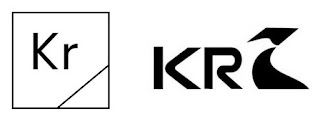The Board affirmed a Section 2(d) refusal of the mark shown below left, for "non-medicated skin serums; facial concealer; pre-moistened cosmetic wipes; and skin moisturizer," finding confusion likely with the registered mark shown below right for, inter alia, cosmetics. Applicant Krete LLC argued that the marks are "clearly distinguishable," but the Board pointed out that "it is not necessary for the marks to be indistinguishable to be found similar." Kretet also pointed to its ownership of a registration for a similar mark for non-medicated skin serums, but the Board was unimpressed. In re Krete LLC, Serial No. 90369855 (June 24, 2002) [not precedential] (Opinion by Judge Peter W. Cataldo).

Examining Attorney Julie Choe submitted dictionary definitions of "cosmetics" as well as a definition provided by the U.S. Food and Drug Administration (FDA). The Board concluded that Krete's goods fell within those definitions. "Simply put, Registrant's goods include cosmetics and sub-types of cosmetic and cosmetic components, and Applicant's goods are types of cosmetics." Seven third-party websites offered, under the same trademark or trade name, goods identified in both the involved application and cited registration.
Krete maintained that its goods are specialty, high end products available in exclusive trade channels, but there were no such limitations in its application. Nor were there any limitations on channels of trade or classes of consumers in the cited registration.
With respect to the marks, the Board found that the "relatively modest geometric designs in the applied-for mark and cited mark do not significantly contribute to the mark's commercial impression, but rather are subordinate to the letters 'KR' in both marks." The Board observed once again that when a mark is comprised of both literal elements and a design, the literal elements is usually accorded greater weight, in part because consumers are likely to remember and use the letters to request the goods.
Krete pointed to the numeral "7" in the cited mark as a distinguishing element, but the Board found no evidence the consumers would view that design element as the number "7." [Looks like a "7" to me - ed]. Nor was there evidence to support Krete's assertion that its mark is a play on the periodic table of elements, signifying that its goods are "scientific, pure, and clinical."
Turning to Krete's prior registration, Krete invoked the Strategic Partners precedent, but that case applies only in very narrow circumstances. The Board noted that "[i]n this case, Applicant's prior registration issued in 2021 and thus is not contestable, for a mark with similar elements identifying some of the goods at issue herein." [Huh? "not contestable"? not incontestable? Something is wrong here, not the least of which is using the term "contestable" or "incontestable" to describe a registration - ed.]. While the Board was sympathetic to Krete's position, it concluded that the existence of the prior registration did not outweigh the other DuPont factors.
And so, the Board affirmed the refusal to register.
The content of this article is intended to provide a general guide to the subject matter. Specialist advice should be sought about your specific circumstances.
